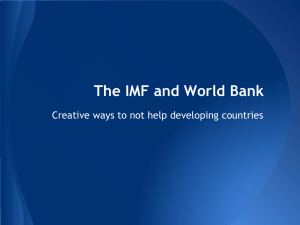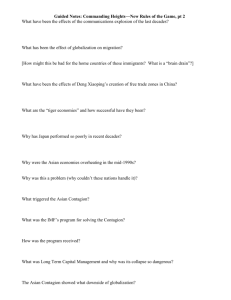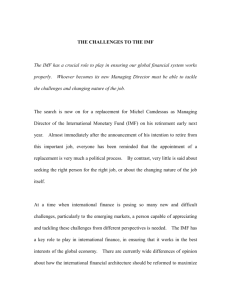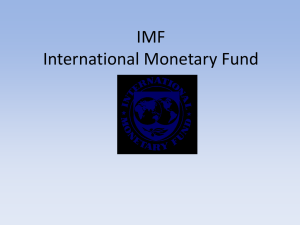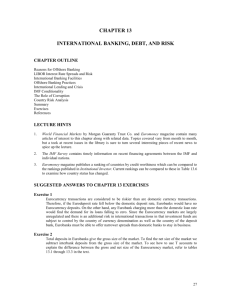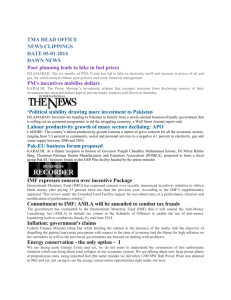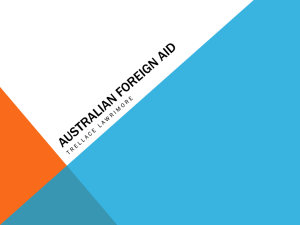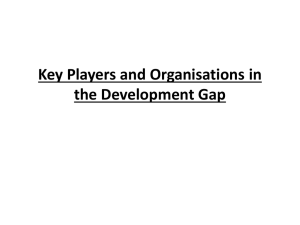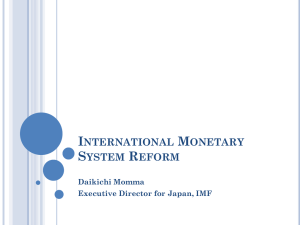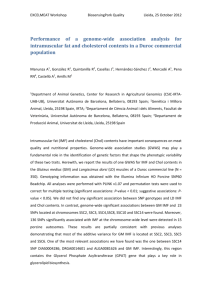Loan Reform and Forgiveness for Developing Countries
advertisement
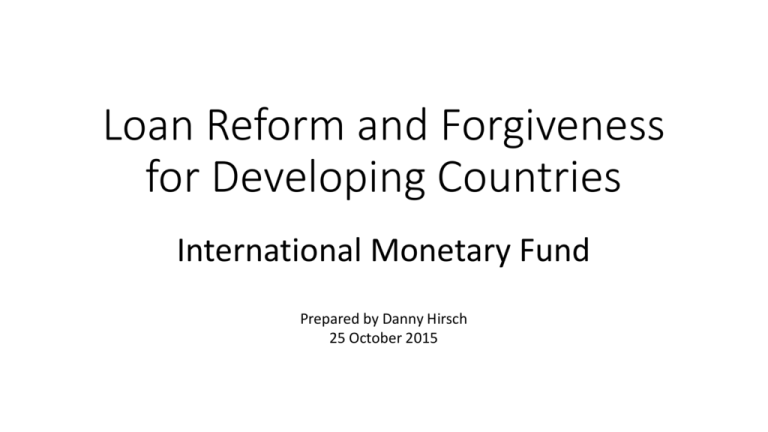
Loan Reform and Forgiveness for Developing Countries International Monetary Fund Prepared by Danny Hirsch 25 October 2015 International Monetary Fund • “The International Monetary Fund (IMF) is an organization of 188 countries, working to foster global monetary cooperation, secure financial stability, facilitate international trade, promote high employment and sustainable economic growth, and reduce poverty.” • Conceived at a United Nations conference in Bretton Woods, New Hampshire in 1944 and created in 1945, in order to promote economic cooperation after World War II and to prevent another Great Depression. • Outcomes of the conference became known as the Bretton Woods system • Original aims included helping developing economies grow and monitoring currency markets. Loans • Today, the IMF’s main role is to give loans, or loan assistance, to member countries with short-term balance of payment problems. • Loan: A borrower receives, or borrows, money from a lender, and must later repay the money to the lender, often with interest. • When a country has more revenue than expenditures in one fiscal year, the country experiences a surplus. • When a country has more expenditures than revenue in one fiscal year, the country experiences a deficit. This is a problem! • A country with a balance of payment deficit must eliminate the deficit by reducing domestic spending or taking out loans. More about Loans! • Through the IMF, developed countries give loans to developing countries. • Nations that give loans are usually creditor nations (balance of payments surplus), and nations that receive loans are usually debtor nations (balance of payments deficit). • Developed countries often attach conditions to loans, which is called conditionality. • Conditions are requirements that borrowers must obey in order to get the money. • Examples: Requirements to use the money (or some of the money) to improve anti-corruption measures, or to privatize certain public services. Concerns: Conditionality and Forgiveness • Are the loans fair to developing countries? • Are the conditions fair, or do they hurt developing countries? • Are the loan repayment periods too short? • Should developing countries receive loan forgiveness or debt relief? • Many developing countries struggle to repay their loans. • Debtor countries may take out more loans to repay earlier loans, which is not a sustainable economic strategy. • Many developing countries ask for loan forgiveness or debt relief, permission to not repay their loans, from the IMF and developed countries. Concerns: Voting • Should the IMF reform its voting system? • Each IMF member country has a quota, based on the size and health of its economy, that determines how much money the country must give to the IMF and how much IMF voting power the country has. • Countries with bigger economies have higher quotas, and therefore more IMF voting power, so developed countries have more power in deciding which countries get loans and how to structure the loans. • • • • • • The United States controls 16.74% of IMF votes. Botswana: 0.06% Azerbaijan: 0.09% El Salvador: 0.10% New Zealand: 0.38% Sweden: 0.98% • Should developing countries have more voting power? Recent Reforms • In 2000, the IMF let 24 Heavily Indebted Poor Countries qualify for some debt forgiveness. • In 2010, the IMF Board of Directors decided to give more voting power to developing countries. • 6% of the voting quota was shifted from developed countries to developing countries. Questions to Consider • Is your country a borrower or a creditor of the IMF? • What is your country’s quota and voting allotment within the IMF? • What have officials in your country said about IMF reforms? • Should the IMF reform the loan agreement process, especially related to conditionality? If so, how? • Should the IMF reform its quota and voting systems? If so, how? • What are the benefits and risks of the IMF forgiving the loans of lesser-developed countries? • Should wide-scale debt forgiveness be a common IMF policy? Will debt forgiveness improve global development? Resources • Global Classrooms guide to the IMF (see the Weebly’s “Class Resources” for the week of October 19) • Website of the International Monetary Fund (http://www.imf.org/external/) • About the IMF (http://www.imf.org/external/about.htm) • IMF lending practices (http://www.imf.org/external/np/exr/facts/howlend.htm) • IMF member country information (http://www.imf.org/external/country/index.htm) • Wikipedia entry on the IMF (only for background information; remember, do NOT cite Wikipedia!) (https://en.wikipedia.org/wiki/International_Monetary_Fund#Reform) Are you ready to start?
